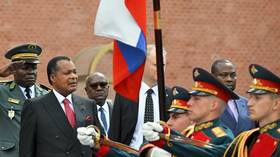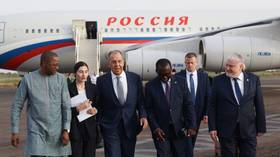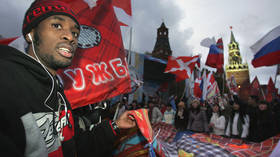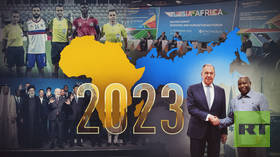Here’s how the Soviet legacy in Africa is paving the way for the multipolar world

Denis Sassou Nguesso, the President of the Republic of the Congo and one of Africa’s political heavyweights, has paid a state visit to Russia. African leaders regularly come to Russia on working visits. In fact, since the Russia-Africa summit held in July 2023, five African heads of state (from South Sudan, Equatorial Guinea, Chad, Guinea-Bissau, and Zimbabwe) have visited Russia. However, a state visit, the highest level of an international visit and the one with the strictest protocol, is a unique event. In 2023, such a visit was made by the President of Algeria, Russia’s strategic partner in Africa, Abdelmadjid Tebboune.
State visits demonstrate an extremely high level of bilateral relations. They include a multiday business and cultural program and visits to several cities (in Sassou Nguesso’s case – Moscow and St. Petersburg). The fact that the president of the Republic of the Congo came to Russia on a state visit is not surprising. For many years, the political dialogue between Brazzaville and Moscow has been stable and marked by trust. Only last month Russian Foreign Minister Sergey Lavrov visited Congo (the final preparations for the state visit were probably discussed at that time), and a high-level Congolese delegation headed by the minister of planning, statistics, and regional integration participated in the St. Petersburg International Economic Forum in June. Russian President Vladimir Putin and Sassou Nguesso also hold regular telephone conversations.
Sassou Nguesso is one of Africa’s most influential politicians. Although the Republic of the Congo is not a leading country on the continent in terms of economic growth, population, or international influence, Sassou Nguesso has trusting relations with many politicians and representatives of the traditional elites, and due to his extensive ties beyond Africa, is an important political mediator and arbitrator. For example, he chairs the AU High Level Committee on Libya and plays an important role in resolving the crisis in the Central African Republic. We must also note Sassou Nguesso’s contribution to the development of an African peace initiative in the Ukraine conflict.
It is noteworthy that when the leaders of the African countries that developed the peace initiative visited Russia and Ukraine, Sassou Nguesso visited only St. Petersburg (in June 2023). He did not go to Kiev personally but sent the head of his office there, which demonstrated his views about the conflict.
Sassou Nguesso has been the leader of the Republic of the Congo since 1979, with only a short break from 1992-1997. Back in 1981, as president of the then socialist-oriented People’s Republic of the Congo, he visited Moscow, and met with Leonid Brezhnev. The friendship treaty which was then signed between the Congo and the USSR is valid to this day.
In recent years, Russia’s economic relations with the Republic of the Congo have grown stronger. Trade turnover has reached $200 million annually, cooperation in the fields of healthcare and education is developing at a fast pace, and the Russian private company Lukoil is implementing a major oil and gas project in the Congo jointly with the Italian energy company Eni.
At the same time, Russian projects must ensure the country’s internal development, its diversification and economic growth – for example, by providing wider access to electricity, improving food security and education. The trust-based political dialogue and friendly ties between the leaders of the two countries established a good foundation for the development of economic relations, but the key point is the development of mutually beneficial bilateral economic initiatives.
According to the Kremlin website, in addition to officials, representatives of Russian state-owned companies Rosatom and Zarubezhneft also participated in the negotiations. Rosatom – one of the largest Russian state-owned corporations – has been a systemic player in Africa for a long time. In the Republic of the Congo, the company is considering constructing two mini-hydroelectric power plants with a total capacity of 500 MW.
Zarubezhneft, which has cooperated with the Congo since Soviet times, can assist in creating pipeline infrastructure and developing domestic markets for petroleum products, oil, and gas. The African delegation’s visit, which lasted several days, also allowed it to hold a series of private talks with other representatives of Russian businesses and government agencies.
Although no agreements were signed during the visit, as is traditional during state visits, Sassou Nguesso was awarded a number of honorary awards and titles. In particular, he was awarded the Order of Honor “for his contribution to the development and strengthening of ties between the Russian Federation and the Republic of the Congo,” and the title of Honorary Doctor of the St. Petersburg branch of one of Russia’s top universities – the Higher School of Economics. On receiving the awards, the president delivered a short lecture on international relations and ecology.
Denis Sassou Nguesso is an outstanding example of a long-serving African politician. Maintaining contacts with Paris, Washington, Beijing, and Moscow, he also enjoys stable support in his own country, which allows him to retain power and maintain relative economic stability.
For Sassou Nguesso, friendship with Russia is not a conjunctural but rather a strategic choice based on the long-term understanding of his country’s development prospects and the global situation. Of course, the Soviet legacy plays an important role in these relations. The example of Sassou Nguesso – a former Marxist-Leninist and the head of the Congolese Labor Party, with its red emblem decorated with a star and crossed hammer and hoe – demonstrates how closely Russia and the USSR are intertwined in Africa, and how Soviet Russia’s experience helps modern Russia to this day.















